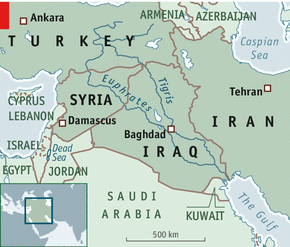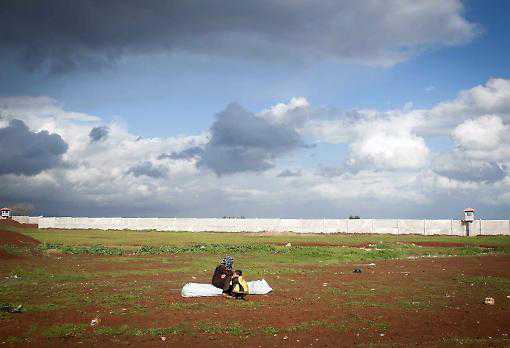A Syrian women and her son wait for help to erect their tent at a refugee camp in Bab al-Salam on the Syria-Turkey border. Photograph: Getty Images
A question for the European politicians thrashing out a plan to provide“assistance” to Syria: if a bedraggled Syrian escapes the war, if he escapes the chaos of the refugee camps in Iraq or Jordan or Turkey, if he arrives tired but hopeful on your doorstep, what will happen to him?
Reporting at the European Union’s most porous borders where Greece and Bulgaria merge with Turkey I was struck by the story of a Syrian refugee who risked drowning to avoid the clasp of the EU’s tortuous asylum and immigration system.
After relating the story of how he was deposited on the banks of Turkey by border patrol officers in Greece, I assumed my interview with Farouk, a Syrian refugee, was finished. It was twilight, and the shabby cafe on the edge of the tiny Bulgarian village was empty. I sat at the head of a small wooden table scribbling into the silence as a dozen pair of striking eyes, various shades of green, watched me curiously. They were all Syrian, thrown together by the war. The two teenage boys were awkward, goofy grins even as they imitated the sound of bombs. The old man, stooped and pot-bellied, eyed me suspiciously. Farouk’s friend spat furiously in Arabic, insisting that he keep quiet. They ate from a large dish of sunflower seeds. I swallowed the remains of a thick, bitter Bulgarian coffee, clumps of sugar clung to the tiny shot-sized glass. “So after that you travelled from Turkey to Bulgaria? How did you cross the border?” I asked.
“No, that’s another story.” We ordered more coffee and Farouk told me about his second “push-back”.
Following his encounter with the border police on River Evros in Greece, Farouk went back to his smuggler, who sent him to the Aegean Sea. He was packed into a large wooden boat bound for Italy with more than 100 other people. Very soon they lost control of the boat, and could do little as it spun in the middle of the ocean between Turkey and Greece. “After three or four hours people started to throw up,” he said. “There was a problem inside the boat, the water started to enter. Everyone was scared and thinking about dying. We had suffered too much.”
On this occasion the Greek maritime police tried to rescue them, but the appointed captain of the boat, another Syrian refugee, deliberately thwarted the attempt. “He had a problem with Greece because he had been caught in Greece before,” said Farouk. Rather than find himself back in Greece, the desperate captain threw an anchor into the sea, which caught on something solid, so even as the Greek officers tried to pull the boat to safety it would not budge and looked certain to capsize. Farouk’s rising terror was compounded by the screams of his fellow passengers, among them young children.
It was the Turkish maritime police that eventually saved them. One of their officers jumped aboard the boat, wrested control from the captain, and steered the boat back to Turkey. All the while the refugees cheered, clapped and sang, “Long live Turkey”.
What made the Syrian captain risk the lives of everyone on the boat to avoid Greece?
The fingerprints of any non-European person who has travelled “unofficially” across borders are taken on arrival in any European Union country. If you want to make a claim for asylum, under the EU’s Dublin II regulations you must do so in the first EU country you enter. There is a European database containing the fingerprints of all irregular migrants and refugees (Eurodac) to track their movements. If you try to make a claim in another EU country, your fingerprints will pop up on a central database indicating the country of entry, and you will be deported back there.
Dublin II could only work if each and every EU country operated an efficient, fair and humane asylum and immigration system. Most EU countries appear to have coherent structures in place, but in reality all over Europe there are hundreds of genuine refugees and children detained in prisons or holding centres, sometimes for months, living in extreme poverty, and stuck in limbo for years while their applications are processed.
From the signing of the European Convention on Human Rights more than 60 years ago to the first tentative steps towards a common asylum system in Dublin in 1990, every piece of EU legislation on asylum and immigration policy has reiterated the continent’s commitment to freedom and justice for all. Indeed when the European Council met to discuss a common asylum system at Tampere in 1999, it was said that to deny those from less free and democratic societies would be to betray Europe’s liberal traditions. But the poor implementation of the current system means Europe is edging toward the betrayal of those traditions, and why a terrified Syrian refugee would rather drown than go back to Greece.
Greece is a tragic example of where Europe’s common asylum system is failing. Up to November last year 26,000 refugees and irregular migrants entered Greece illegally, with Syrians the largest group after Afghans. Around 90 per cent of all migrants and refugees entering Europe unofficially enter through Greece, which embodies the worst of the differing national asylum and immigration systems across the European Union’s 27 member states. Greece’s system had already collapsed before its financial problems hit. By 2010 the backlog for asylum claims had crept towards 70,000; Médecins Sans Frontières declared the state of immigration holding centres “medieval”; and a quarter of a million undocumented migrants and refugees haunt the city of Athens alone trapped in various states of destitution, unable to leave legally because of the Dublin II regulations.
Najib tried to escape his Greek nightmare several times. The 25-year-old Afghan made it as far as Germany, where he lived for one year before he was caught and told to leave within 10 days. He went to the Netherlands; they sent him back to Germany, where he spent a month in prison before being deported back to Greece, the country of his first fingerprint. Confined to Athens, Najib contends with daily harassment from the police and Golden Dawn. When a Golden Dawn supporter beat him up, he went to the police, who asked for his ID, and on seeing his temporary residence permit was out of date, jailed him for 10 days.
I don’t know what happened to the captain who panicked, but others on the boat were forced to go back to the Aegean Sea. Many could not afford to find a safer passage. They drowned when their boat sank killing 60 people on 6 September last year.
Shaken, Farouk decided to stick to land for the rest of his journey, and hoping for a warmer European reception elsewhere, he crossed the border into Bulgaria.






